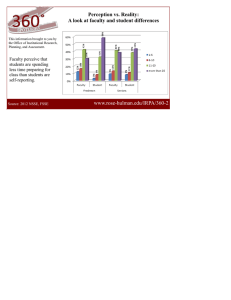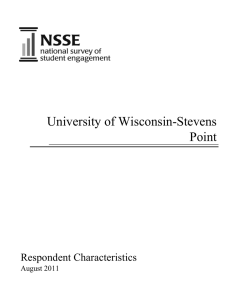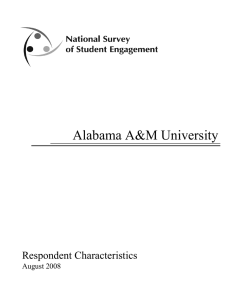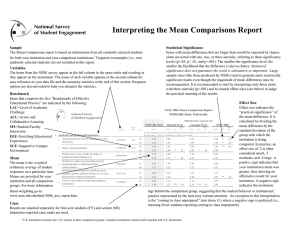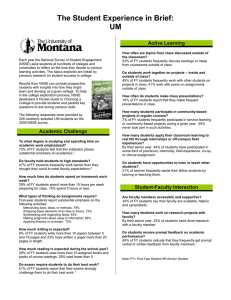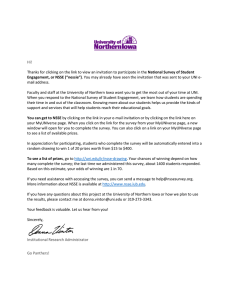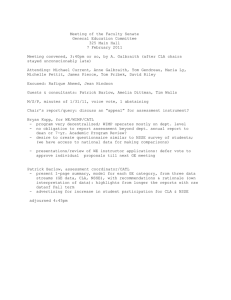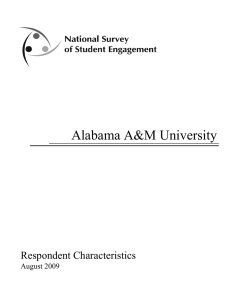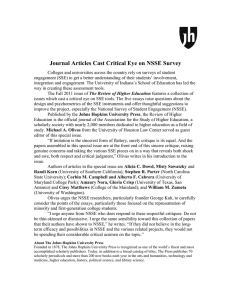NSSE 2009 Invitation to Participate
advertisement
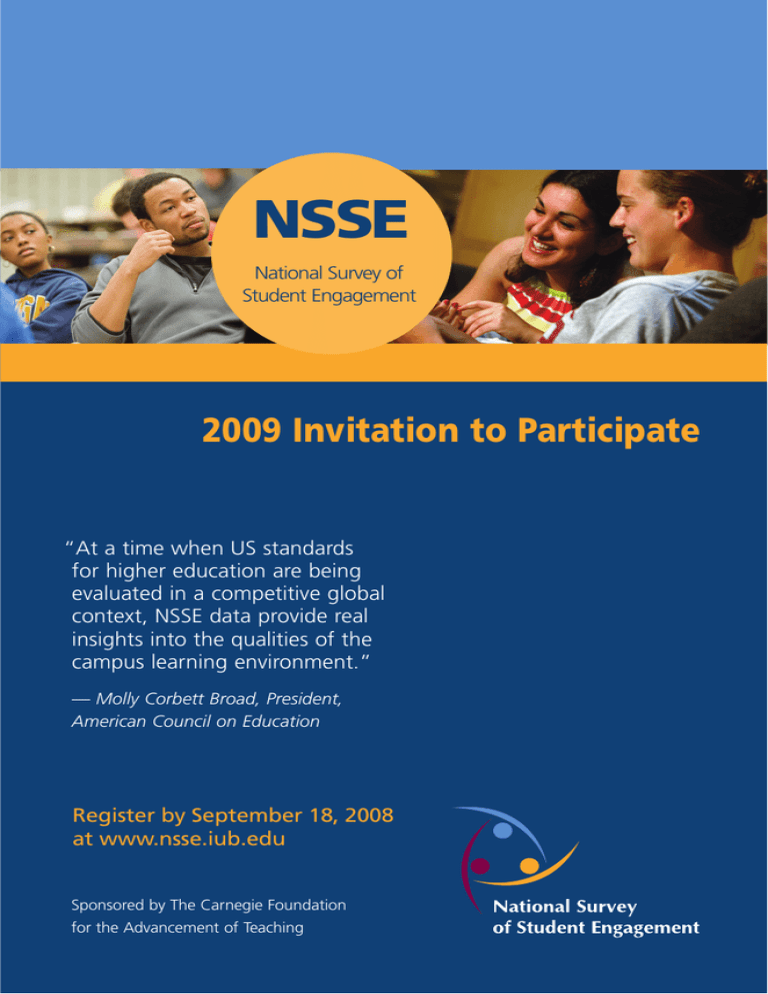
NSSE National Survey of Student Engagement 2009 Invitation to Participate “At a time when US standards for higher education are being evaluated in a competitive global context, NSSE data provide real insights into the qualities of the campus learning environment.” — Molly Corbett Broad, President, American Council on Education Register by September 18, 2008 at www.nsse.iub.edu Sponsored by The Carnegie Foundation for the Advancement of Teaching What is NSSE? More than 1,300 four-year colleges and universities in the United States and Canada have used the National Survey of Student Engagement to document the extent to which students, faculty, and institutions engage in empirically-proven educational activities and to inform programs and practices that foster student engagement. The NSSE instrument is short, reliable, and easy for students to complete. It asks undergraduates about their in- and out-of-class activities, what they feel they have gained from classes, their assessment of the quality of interactions with faculty and students, and other educationally-purposeful activities. The results are organized into five benchmarks of effective educational practice: Level of Academic Challenge Active and Collaborative Learning Student-Faculty Interaction Enriching Educational Experiences Supportive Campus Environment Why Should Institutions Participate in NSSE? Institutions can use NSSE data to measure aspects of the undergraduate experience inside and outside the classroom that are consistent with good practice in undergraduate education. Assessing student engagement is a central component of evaluating overall educational effectiveness. Participating schools use their NSSE results in many ways, including: Assessment and improvement Benchmarking Accountability Institutional research Accreditation and self-studies Retention Curricular reform Alumni outreach Grant writing Recruitment Faculty and staff development State system comparisons Assessment of student satisfaction Performance indicators “NSSE is an institution’s most trustworthy lens for seeing deeply into the quality of students’ experiences. Its results translate directly into plans for action and strategies of reform and transformation.” — Lee S. Shulman, President, The Carnegie Foundation for the Advancement of Teaching 2 Hendrix College What Does a Participating Institution Receive? Institutions receive detailed analyses and information tools, including: Customized Institutional Report – Presents your students’ responses by class year and provides statistical comparisons with three customized peer groups. Benchmark Report – Compares your students’ scores with those of peer institutions on the five NSSE benchmarks of effective educational practice. Institutional Data File – Includes raw student responses to all survey items, including student identifiers for additional in-depth analyses. Annual Report – Discusses data trends, NSSE initiatives, and the landscape of undergraduate assessment. Accreditation Toolkit – Highlights ways to incorporate NSSE data into regional and specialized accreditation efforts. Additional User Tools – Resources to support sharing your NSSE results with internal and external audiences via a facilitation guide, PowerPoint template, and more. For examples of these materials and additional information visit: www.nsse.iub.edu How Does NSSE Help Institutions Understand and Use Their Results? The NSSE Institute for Effective Educational Practice assists colleges and universities in using student engagement data to support institutional improvement and accountability efforts. Institute associates are available for: Facilitating regional and campus workshops and Webinars to stimulate discussion about ways to use NSSE data. Conducting assessments of campus conditions that promote student success. Evaluating the impact of curricular innovations and student success initiatives. Working with campuses, systems, and state organizations. Conducting research to better understand student success and educational effectiveness. 3 “For several years we debated the need for substantive reform of our first-year curriculum. NSSE results provided evidence to persuade the faculty to change, and helped inform the new curriculum that we are now implementing.” — Richard F. Vaz, Dean for Interdisciplinary and Global Studies, Worcester Polytechnic Institute Alaska Pacific University How is NSSE Administered? The survey is administered each spring term (February through May) to random samples of first-year and senior students at baccalaureate-granting colleges and universities. Two-year colleges may use the Community College Survey of Student Engagement (www.ccsse.org). Participating Institutions: Provide a student population data file containing contact information for all first-year and senior students; Work with NSSE to customize invitation materials; Partner with NSSE to ensure compliance with federal guidelines pertaining to research with human subjects during the survey administration process. The NSSE survey is approved annually by the Human Subjects Committee at Indiana University Bloomington. Participants should coordinate with their home institutional review boards to ensure adherence to regulations regarding the protection of human subjects. NSSE: Assigns a client service team to assist survey administration; Selects random samples from student population files; Distributes survey invitations to all sampled students; Follows up with non-respondents; Oversees data collection and provides technical support; Prepares institution-specific reports of institutional results. 4 Modes of Administration Both Web-based and paper survey administration modes are available. We generally recommend Web-based modes, as these provide larger sample sizes, leading to more accurate population estimates, for the same cost. See our Web site (www.nsse.iub.edu/html/survey_modes.cfm) for more tips on choosing the best survey administration mode for your institution, or call our office to speak with a Project Associate. Web-only. Students receive all correspondence by e-mail and complete the Web version of the survey. This mode requires an accurate list of student e-mail addresses. Web+. Students receive their first three contacts by e-mail. For the fourth contact, depending upon preliminary response rates, a sample of nonrespondents may receive a paper version of the survey while the remaining non-respondents receive another e-mail. This mode requires an accurate list of both student e-mail addresses and postal mailing addresses. Paper. Students receive a paper survey instrument in two postal mailings, with the option to complete the Web version. Students at institutions without sufficient e-mail addresses also receive one reminder postcard. If e-mail addresses are available, students receive three reminders via e-mail instead of the paper postcard. This mode requires an accurate list of student postal mailing addresses. How Do I Register for NSSE 2009? To register for NSSE 2009 go to www.nsse.iub.edu. For additional information about NSSE call 866-435-6773 toll free. The deadline to register is Thursday, September 18, 2008. “BCSSE and NSSE results have helped guide our thinking and planning over the past two years as the campus engaged in a broad-based strategic planning process.” — Marianne D. Kennedy, Professor and Coordinator of Assessment and Planning, Southern Connecticut State University Towson University 5 What Does it Cost to Participate in NSSE? Required Fees $300 (non-refundable; waived for Institutional participation fee 2008 BCSSE participants) Sampling fee NSSE Standard Sample Size Undergraduate Enrollment Paper Web+ Web-only Fee Fewer than 4,000 450 1,800 All FY & SR $3,375 4,000 to 7,999 600 2,400 3,000 $4,500 8,000 to 12,000 More than 12,000 800 3,200 4,000 $6,000 1,000 4,000 5,000 $7,500 The sample sizes above apply only to first-year students and seniors who meet NSSE population file specifications. Final sample sizes may be smaller due to changes in student enrollment after samples are drawn. Institutions with 400 or fewer students in their combined first-year and senior classes should check our Web site (www.nsse.iub.edu/faq/ifaq.cfm#surveycost) for fees. Optional Fees Oversampling To increase the number of students surveyed on your campus beyond the standard sample sizes outlined above, request an oversample. Institutions do so for several reasons: (a) to raise total participation to enhance data quality, (b) to boost participation from underrepresented students, and (c) to have sufficient data to analyze at the school, department, or other subpopulation level. Oversampling Fees (per student) Web-only (NSSE administers) Paper (NSSE administers) Paper (Institution administers) $1.50 $7.50 $2.00 Consortia and Multi-campus Systems A consortium is a group of six or more participating NSSE colleges or universities sharing aggregated data for comparisons within their group. Multi-campus systems may also elect this option. Consortia may add up to 20 additional questions developed and agreed upon by member institutions and approved by NSSE. Undergraduate Enrollment Fee (per institution) Fewer than 4,000 4,000 to 7,999 8,000 to 12,000 More than 12,000 6 $200 $300 $400 $500 NSSE Companion Surveys The Beginning College Survey of Student Engagement (BCSSE) The Beginning College Survey of Student Engagement (BCSSE) is designed to be paired with your NSSE administration, to provide an in-depth understanding of first-year students’ high school academic and co-curricular experiences, as well as their expectations for participating in educationally purposeful activities during the first college year. Used in combination with NSSE or FSSE results, BCSSE results can help institutions assess the impact of initiatives in recruitment, curricular reform, academic advising, first-year program evaluation, retention, faculty and staff development, and accreditation. BCSSE administration can take place as part of new student orientation programs in the summer or during the first two weeks of the fall term. The survey is administered locally in both paper and Web-based formats. The early participation fee for BCSSE is $300 (after June 6: $400). For institutions conducting a paired BCSSE-NSSE administration (e.g., BCSSE 2008 and NSSE 2009), the NSSE institutional participation fee will be waived (sampling fees still apply). More information about BCSSE can be found at: www.bcsse.iub.edu. The Faculty Survey of Student Engagement (FSSE) The Faculty Survey of Student Engagement (FSSE) is designed to complement NSSE by providing information about faculty perceptions of student engagement and actions faculty take to shape student engagement. Together, results from FSSE and NSSE can be used as a catalyst for productive discussions related to teaching, learning, and the quality of students’ educational experiences. FSSE administration can take place concurrent with an institution’s NSSE administration or during the following spring (e.g., NSSE 2009 institutions can participate in 2009 or 2010). Faculty members are contacted via e-mail and respond online. More information about FSSE can be found at: www.fsse.iub.edu. “NSSE is becoming increasingly helpful in improving student success and building public confidence in the commitment of colleges and universities to improve teaching and learning.” — Paul E. Lingenfelter, President, State Higher Education Executive Officers University of Akron 7 How Do I Register for NSSE 2009? To register for NSSE 2009 go to www.nsse.iub.edu. For additional information about NSSE call 866-435-6773 toll free. Important Dates to Remember for NSSE 2009 The deadline to register is Thursday, September 18, 2008. May-September 2008 Registration for NSSE 2009 on going (Deadline September 18, 2008) August 2008 Registration confirmation begins Consortium enrollment begins (Deadline October 2, 2008) September 2008 Institutions submit customized survey invitations November 2008 NSSE sampling begins January/February 2009 NSSE survey administrations begin (vary by school calendar) June 1, 2009 NSSE online survey closes August 2009 Institutional Reports sent to participating institutions October 2008 NSSE and institutions finalize consortium questions (Deadline October 18, 2008) Institutions submit student population files (Deadline October 30, 2008) Institutions finalize customized survey invitations (Deadline October 30, 2008) Cover photos: (L) University of Michigan (R) Austin College Indiana University Center for Postsecondary Research 1900 East Tenth Street, Suite 419 Bloomington, IN 47406-7512 Phone: 812-856-5824 Fax: 812-856-5150 E-mail: nsse@indiana.edu Web: www.nsse.iub.edu
